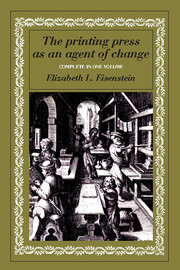Book contents
- Frontmatter
- Dedication
- Contents
- Preface
- Part One Introduction to an Elusive Transformation
- 1 The unacknowledged revolution
- 2 Defining the initial shift; some features of print culture
- Part Two Classical and Christian Traditions Reoriented; Renaissance and Reformation Reappraised
- Part Three The Book of Nature Transformed
- Conclusion: Scripture and nature transformed
- Bibliographical index
- General index
1 - The unacknowledged revolution
Published online by Cambridge University Press: 05 September 2013
- Frontmatter
- Dedication
- Contents
- Preface
- Part One Introduction to an Elusive Transformation
- 1 The unacknowledged revolution
- 2 Defining the initial shift; some features of print culture
- Part Two Classical and Christian Traditions Reoriented; Renaissance and Reformation Reappraised
- Part Three The Book of Nature Transformed
- Conclusion: Scripture and nature transformed
- Bibliographical index
- General index
Summary
In the late fifteenth century, the reproduction of written materials began to move from the copyist's desk to the printer's workshop. This shift, which revolutionized all forms of learning, was particularly important for historical scholarship. Ever since then, historians have been indebted to Gutenberg's invention; print enters their work from start to finish, from consulting card-files to reading page-proofs. Because historians are usually eager to investigate major changes and this change transformed the conditions of their own craft, one would expect the shift to attract some attention from the profession as a whole. Yet any historiographical survey will show the contrary to be true. It is symbolic that Clio has retained her handwritten scroll. So little has been made of the move into new workshops, that after five hundred years, the muse of history still remains outside. ‘History bears witness to the cataclysmic effect on society of inventions of new media for the transmission of information among persons. The development of writing and later the development of printing are examples…’ Insofar as flesh-and-blood historians who turn out articles and books actually bear witness to what happened in the past, the effect on society of the development of printing, far from appearing cataclysmic, is remarkably inconspicuous. Many studies of developments during the last five centuries say nothing about it at all.
- Type
- Chapter
- Information
- The Printing Press as an Agent of Change , pp. 3 - 42Publisher: Cambridge University PressPrint publication year: 1980



